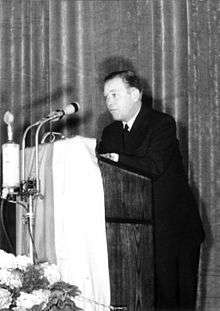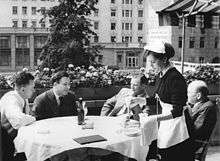Otto John


Otto John (19 March 1909 – 26 March 1997) was the first head of West Germany's domestic intelligence service, the Office for the Protection of the Constitution, from 1950 to 1954. He is best known for his controversial move to East Germany in 1954, which has been interpreted as treason or an abduction.
Life
Otto John was born in Marburg. He earned a doctorate of law from the University of Marburg.[1] He married Lucie Manén in 1949.[2]
John was involved in the plot of 20 July 1944 to assassinate Adolf Hitler, for which his brother, Hans, was executed.[2] At the time, he worked as a lawyer at the Deutsche Lufthansa legal office in Madrid and used contacts he had made with British intelligence to escape to England and avoid certain execution. In England he worked for the BBC German Language Service and in black propaganda at The Rookery, Apsley Guise (RAG),[3] and towards the end of the conflict for Soldatensender Calais.
After the war, he helped British authorities to categorise the degree of Nazi ideology of German wartime leaders and appeared as a witness at the Nuremberg War Crimes Trials. During the trial of Erich von Manstein he worked as an interpreter.[2]
On 4 December 1950 he was appointed president of the West German Federal Office for the Protection of the Constitution (Bundesamt für Verfassungsschutz). His appointment went against the will of Chancellor Konrad Adenauer but was supported by British officials.
On 20 July 1954, after a ceremony remembering the conspirators of 1944, he disappeared. He reappeared three days later in East Berlin, stating that he had decided to move to East Germany and criticizing Adenauer's policies of remilitarisation and integration into the Western Bloc, which in his view hampered German reunification. He also criticized the appointment of former Nazis to high offices, such as Theodor Oberländer and Reinhard Gehlen.
From August to December he was interrogated by the KGB in Moscow before he returned to East Berlin, where he resumed his criticism of West Germany as a speaker. During that time he was surveilled by East Germany's security service, the Staatssicherheit.
On 12 December 1955, John again defected to West Germany where he was instantly arrested. He now claimed that his move to East Berlin was not voluntary but that he was abducted by the KGB. As his explanations were not believed, he was charged with treason and sentenced to four years' imprisonment but was released on 28 July 1958. John expressed bitterness about the fact that in the court that found him guilty, there were judges who had been on the bench during the Hitler era.
He died in 1997, at an Innsbruck sanatorium, after years of trying to get rehabilitation for his treason conviction.[1]
Books
- Twice Through the Lines - Futura Publications (1974). ISBN 978-0-86007-036-8
References
- 1 2 "Otto John, 88, Bonn Official At Center of Counterspy Mystery". The New York Times. 1997-03-31.
- 1 2 3 "Obituary: Otto John". The Independent. 1997-04-01.
- ↑ Willi Frischauer, The Man Who Came Back: The Story of Otto John, ebook ISBN 978-1-78301-282-4. Unmaterial Books, 2013
External links
| Wikimedia Commons has media related to Otto John. |
- "The Man with 1,000 Secrets" Time Magazine, August 2, 1954.